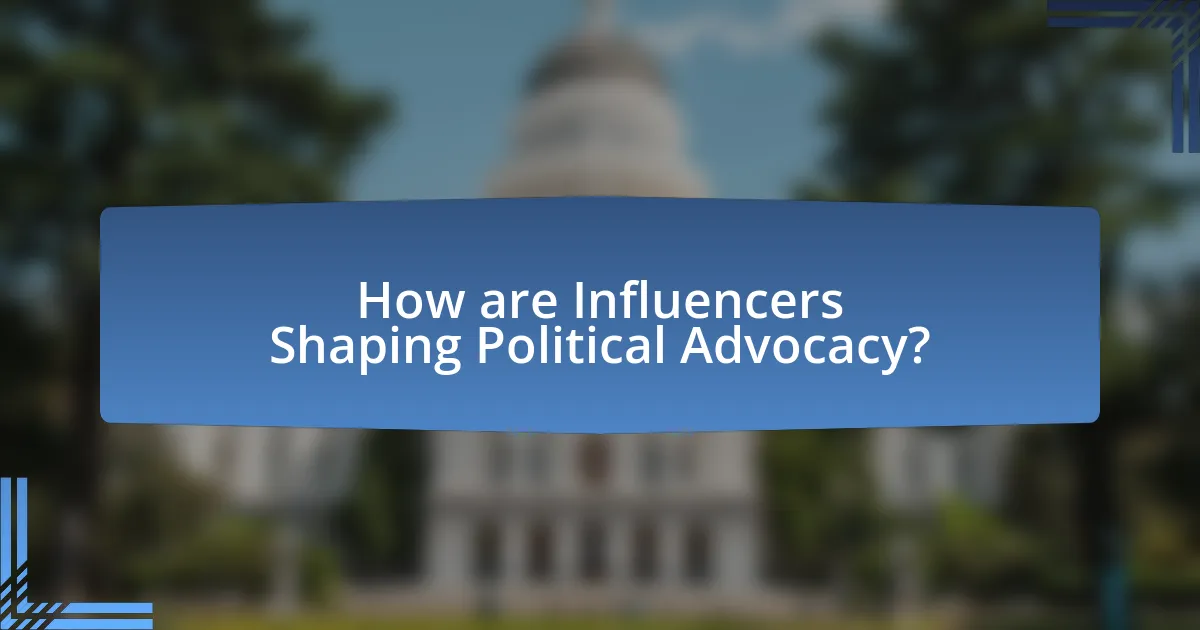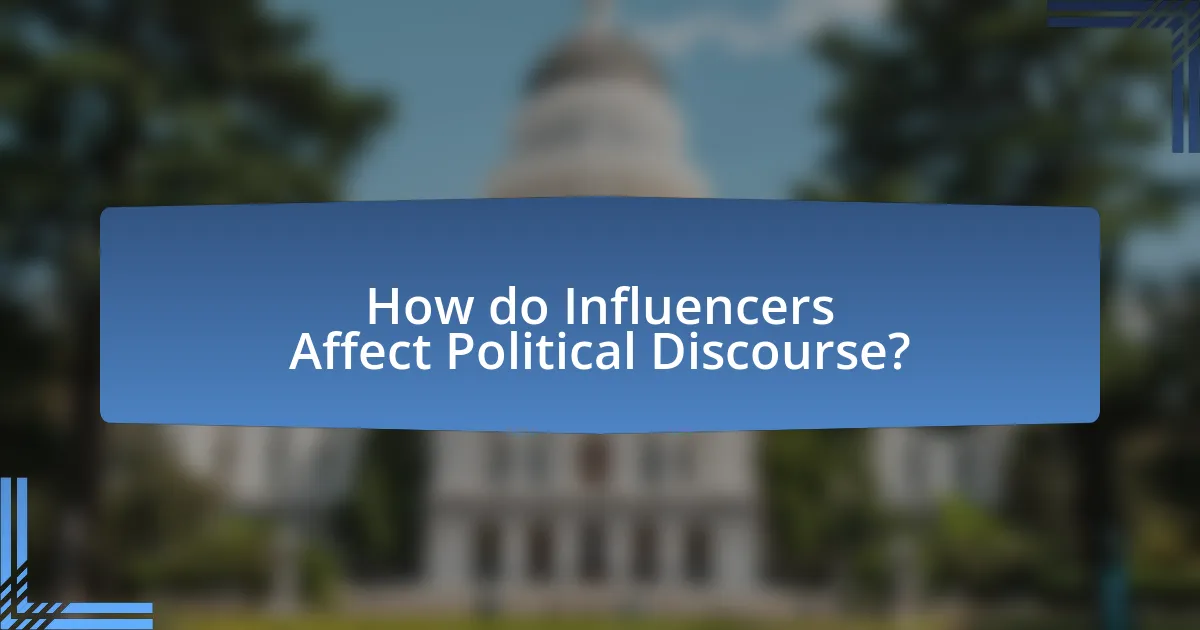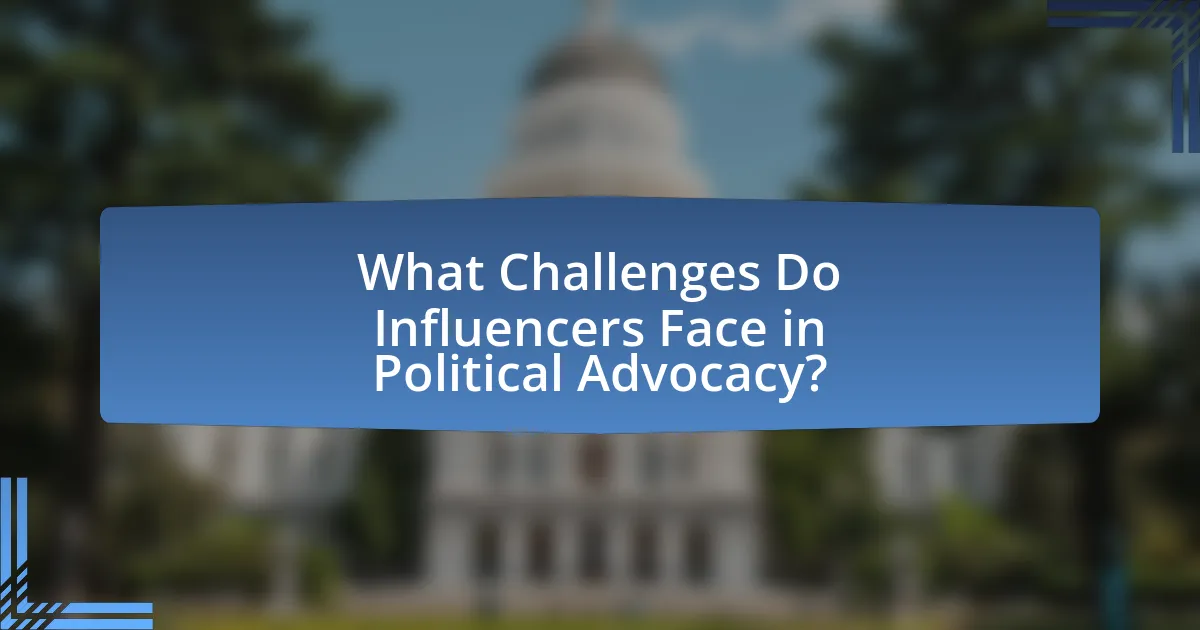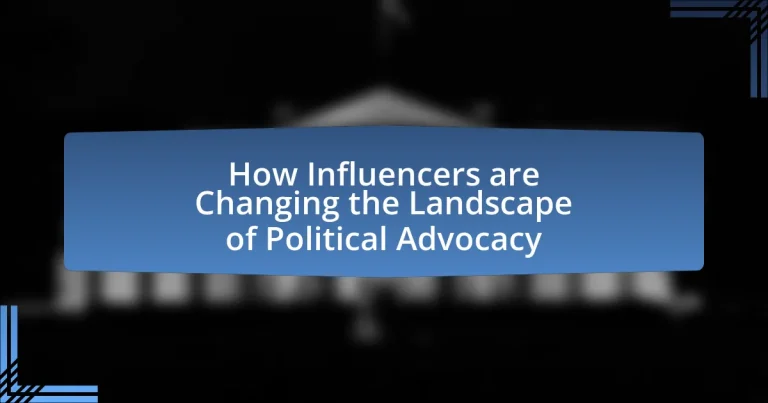The article examines how influencers are transforming political advocacy through their extensive social media reach, effectively engaging audiences and mobilizing civic participation. It highlights the significant role influencers play in modern political campaigns, particularly in shaping public opinion and increasing voter engagement among younger demographics. The piece discusses various strategies influencers use to promote political messages, the ethical considerations surrounding their involvement, and the challenges they face, such as credibility issues and audience polarization. Additionally, it explores future trends in influencer advocacy, including the impact of emerging platforms and technology on political discourse.

How are Influencers Shaping Political Advocacy?
Influencers are shaping political advocacy by leveraging their extensive social media reach to mobilize and engage audiences on political issues. They create awareness, drive conversations, and encourage civic participation, often reaching demographics that traditional political campaigns struggle to engage. For instance, a study by the Pew Research Center found that 72% of teens use social media, making it a critical platform for political messaging. Influencers can effectively communicate complex political ideas in relatable ways, thus enhancing public understanding and involvement in advocacy efforts.
What role do influencers play in modern political campaigns?
Influencers play a significant role in modern political campaigns by shaping public opinion and mobilizing voter engagement through their extensive reach on social media platforms. They leverage their credibility and follower trust to communicate political messages, often targeting younger demographics that traditional media struggles to engage. For instance, during the 2020 U.S. presidential election, influencers like Alexandria Ocasio-Cortez utilized platforms like Instagram to connect with millions, resulting in increased voter turnout among younger voters. This demonstrates that influencers not only amplify campaign messages but also actively participate in the political discourse, making them crucial assets in contemporary political strategy.
How do influencers engage with their audience on political issues?
Influencers engage with their audience on political issues primarily through social media platforms, where they share content that reflects their political views and encourages discussion. They utilize various formats such as posts, stories, live streams, and videos to present information, promote causes, and mobilize their followers. For instance, influencers often leverage their large followings to raise awareness about specific political events or social movements, effectively reaching millions of people. Research indicates that influencers can significantly impact public opinion; a study by the Pew Research Center found that 70% of young adults are influenced by social media personalities when forming their political views. This demonstrates the powerful role influencers play in shaping political discourse and engaging their audience on critical issues.
What strategies do influencers use to promote political messages?
Influencers promote political messages through strategies such as leveraging social media platforms, creating engaging content, and fostering community engagement. By utilizing platforms like Instagram, Twitter, and TikTok, influencers reach large audiences quickly, often using visually appealing graphics or videos to convey their messages effectively. For instance, during the 2020 U.S. elections, influencers mobilized their followers to participate in voter registration drives, showcasing the power of their reach. Additionally, influencers often collaborate with political organizations to amplify their messages, as seen with campaigns that encourage youth voter turnout. This strategic partnership enhances credibility and encourages followers to engage with political content actively.
Why is influencer advocacy becoming more prominent?
Influencer advocacy is becoming more prominent due to the increasing trust and engagement that audiences have with social media influencers. Research indicates that 70% of teenagers trust influencers more than traditional celebrities, which highlights the effectiveness of influencers in shaping opinions and mobilizing communities. This shift is further supported by the rise of digital platforms where influencers can reach large, targeted audiences quickly, making them powerful advocates for political causes.
What factors contribute to the rise of influencers in politics?
The rise of influencers in politics is primarily driven by the increasing use of social media platforms, which facilitate direct communication between influencers and their audiences. Social media allows influencers to reach large, engaged followings quickly, bypassing traditional media gatekeepers. Additionally, the decline of trust in conventional political institutions has led audiences to seek authentic voices, often found in influencers who present relatable perspectives. Research indicates that 70% of millennials trust influencers more than traditional celebrities, highlighting their impact on political discourse. Furthermore, influencers often leverage their platforms to mobilize grassroots movements, as seen in campaigns like the Women’s March, which utilized social media to organize and amplify voices.
How has social media changed the landscape of political advocacy?
Social media has fundamentally transformed political advocacy by enabling direct communication between politicians and the public, fostering grassroots movements, and amplifying diverse voices. Platforms like Twitter and Facebook allow for real-time engagement, where politicians can share their messages instantly and respond to constituents’ concerns, as evidenced by the significant role social media played in the 2008 Obama campaign, which utilized platforms to mobilize young voters effectively. Additionally, social media facilitates the organization of grassroots campaigns, exemplified by movements such as #BlackLivesMatter, which gained momentum through viral sharing and community engagement online. This shift has democratized political discourse, allowing individuals and groups to influence policy discussions and mobilize support without traditional media gatekeeping.
What are the potential impacts of influencer-led political advocacy?
Influencer-led political advocacy can significantly shape public opinion and mobilize voter engagement. Influencers leverage their large followings to disseminate political messages, often leading to increased awareness and participation in political issues. For instance, a study by the Pew Research Center found that 55% of social media users have engaged with political content, indicating that influencers can effectively reach and influence a substantial audience. Additionally, influencer advocacy can drive grassroots movements, as seen in campaigns like the Ice Bucket Challenge, which raised awareness for ALS and demonstrated how social media can amplify political and social causes.
How can influencers mobilize voters and increase participation?
Influencers can mobilize voters and increase participation by leveraging their platforms to engage audiences through targeted messaging and calls to action. They utilize social media to disseminate information about voting processes, deadlines, and the importance of civic engagement, which can significantly impact voter turnout. For instance, a study by the Pew Research Center found that 69% of adults aged 18-29 reported that social media influenced their decision to vote in the 2020 election. By creating relatable content and fostering community discussions, influencers can effectively motivate their followers to participate in elections, thereby enhancing overall voter engagement.
What are the risks associated with influencer involvement in politics?
Influencer involvement in politics poses several risks, including the potential for misinformation, polarization, and the undermining of democratic processes. Misinformation can spread rapidly through influencers’ platforms, leading to the dissemination of false narratives that can mislead the public. For instance, a study by the Pew Research Center found that 64% of Americans believe that misinformation has a significant impact on political discourse. Additionally, influencers can contribute to political polarization by promoting extreme viewpoints, which can alienate moderate voices and create echo chambers. This was evident during the 2020 U.S. presidential election, where social media influencers played a role in amplifying divisive content. Lastly, the involvement of influencers can undermine democratic processes by prioritizing popularity over informed debate, as seen in instances where celebrity endorsements overshadow substantive policy discussions.

How do Influencers Affect Political Discourse?
Influencers significantly shape political discourse by leveraging their platforms to disseminate information, mobilize audiences, and frame political narratives. Their ability to reach large, engaged followings allows them to amplify specific political messages, often leading to increased awareness and participation in political issues. For instance, a study by the Pew Research Center found that 55% of social media users have engaged with political content, indicating that influencers play a crucial role in shaping public opinion and political engagement. Additionally, influencers often serve as trusted sources of information for their followers, which can lead to shifts in political attitudes and behaviors, particularly among younger demographics who are more likely to rely on social media for news.
What types of political content do influencers typically share?
Influencers typically share a variety of political content, including opinion pieces, advocacy for specific policies, information on social justice issues, and calls to action for voter participation. This content often aims to engage their audience in political discourse and mobilize them around particular causes. For instance, influencers may post about climate change initiatives, racial equality movements, or healthcare reforms, using their platforms to raise awareness and encourage activism. Research indicates that 70% of young voters are influenced by social media content when making political decisions, highlighting the significant impact of influencers in shaping political opinions and behaviors.
How do influencers curate their political messages for their audience?
Influencers curate their political messages for their audience by tailoring content to resonate with their followers’ values and beliefs. They analyze audience demographics, preferences, and engagement patterns to craft messages that align with their audience’s interests. For instance, influencers often utilize storytelling techniques and relatable language to make complex political issues more accessible, thereby enhancing audience connection and engagement. Research indicates that influencers who align their political messaging with their audience’s existing beliefs can significantly increase message effectiveness, as seen in studies highlighting the impact of social media on political mobilization.
What are the most effective platforms for influencer political advocacy?
The most effective platforms for influencer political advocacy are Instagram, Twitter, and TikTok. Instagram allows influencers to share visually engaging content that can quickly capture attention and mobilize followers around political issues. Twitter serves as a real-time communication tool, enabling influencers to engage in discussions, share news, and amplify messages rapidly. TikTok, with its short-form video format, has gained popularity among younger audiences, making it a powerful platform for creative political messaging and grassroots movements. These platforms have been shown to significantly increase engagement and awareness around political topics, as evidenced by campaigns that have successfully mobilized large audiences through these channels.
How do influencers shape public opinion on political issues?
Influencers shape public opinion on political issues by leveraging their large followings to disseminate information, mobilize support, and frame narratives. Their ability to connect with audiences on social media platforms allows them to present political content in relatable and engaging ways, often leading to increased awareness and discussion around specific issues. For instance, a study by the Pew Research Center found that 70% of young adults are influenced by social media personalities when forming opinions on political matters. This demonstrates that influencers can significantly impact the political landscape by shaping perceptions and encouraging civic engagement among their followers.
What methods do influencers use to persuade their followers?
Influencers use various methods to persuade their followers, including authenticity, storytelling, social proof, and targeted engagement. Authenticity builds trust, as followers are more likely to respond positively to influencers who present themselves genuinely. Storytelling captivates audiences by creating emotional connections, making messages more relatable and memorable. Social proof, such as showcasing endorsements or testimonials, reinforces credibility and encourages followers to adopt similar views or behaviors. Targeted engagement, through personalized interactions and responding to comments, fosters a sense of community and loyalty among followers, enhancing the influencer’s persuasive impact.
How do influencers respond to backlash or criticism regarding their political views?
Influencers typically respond to backlash or criticism regarding their political views by either addressing the criticism directly through social media platforms or by choosing to remain silent. When they choose to engage, influencers often clarify their positions, provide additional context, or express their intent behind their views. For instance, a study by the Pew Research Center found that 69% of social media users believe that influencers should be transparent about their political affiliations, which indicates that influencers may feel pressured to explain their perspectives to maintain credibility. Conversely, some influencers opt for silence to avoid further escalation or backlash, reflecting a strategic decision to protect their brand and audience engagement.

What Challenges Do Influencers Face in Political Advocacy?
Influencers face several challenges in political advocacy, including credibility issues, audience polarization, and regulatory constraints. Credibility is often questioned as influencers may lack formal political expertise, leading to skepticism about their motives and knowledge. Audience polarization complicates their efforts, as followers may have diverse or conflicting political views, making it difficult to unify support for a cause. Additionally, regulatory constraints, such as disclosure requirements for sponsored content, can limit the effectiveness of their messaging and advocacy efforts. These challenges hinder influencers’ ability to mobilize and engage their audiences effectively in political discourse.
What ethical considerations arise from influencer political advocacy?
Influencer political advocacy raises several ethical considerations, primarily concerning authenticity, transparency, and the potential for manipulation. Influencers often have significant sway over their followers, which can lead to the dissemination of biased or misleading information if they do not disclose their affiliations or the sources of their content. For instance, the Federal Trade Commission (FTC) mandates that influencers disclose paid partnerships to ensure transparency, yet many fail to do so, leading to ethical dilemmas regarding trust and accountability. Additionally, the risk of influencers promoting political agendas without adequate knowledge or understanding of the issues can result in the spread of misinformation, undermining informed public discourse.
How do influencers navigate the balance between personal beliefs and audience expectations?
Influencers navigate the balance between personal beliefs and audience expectations by strategically aligning their content with their values while remaining attuned to their audience’s preferences. They often conduct audience analysis to understand the demographics and interests of their followers, which informs their content decisions. For instance, a study by the Pew Research Center indicates that 72% of social media users follow influencers for their authenticity, suggesting that influencers who maintain their personal beliefs while addressing audience expectations can foster trust and engagement. By selectively sharing their views and engaging in dialogue, influencers can create a space where their beliefs resonate with their audience, thus maintaining their integrity while meeting audience expectations.
What regulations impact influencers in political campaigning?
Influencers in political campaigning are primarily impacted by regulations such as the Federal Election Commission (FEC) rules, which require disclosure of sponsorships and endorsements. These regulations mandate that influencers must clearly identify when they are being compensated for promoting a political candidate or cause, ensuring transparency in political advertising. Additionally, the Communications Decency Act provides some protections for platforms hosting influencer content, while state laws may impose further restrictions on campaign contributions and advertising practices. These regulations aim to maintain integrity in political discourse and prevent misinformation.
How can influencers effectively advocate for political causes?
Influencers can effectively advocate for political causes by leveraging their platforms to raise awareness, engage their audience, and mobilize action. They can create compelling content that highlights specific issues, using storytelling and personal experiences to resonate with followers. For instance, influencers like Alexandria Ocasio-Cortez have utilized social media to discuss policies and engage younger demographics, resulting in increased voter turnout among millennials. Additionally, influencers can collaborate with organizations to amplify messages, as seen in campaigns like #BlackLivesMatter, where influencers played a crucial role in spreading information and encouraging participation in protests. This approach not only informs their audience but also fosters a sense of community and collective action, making their advocacy efforts more impactful.
What best practices should influencers follow when engaging in political advocacy?
Influencers should prioritize transparency and authenticity when engaging in political advocacy. This means clearly disclosing any affiliations, sponsorships, or potential conflicts of interest to maintain credibility with their audience. Research indicates that 86% of consumers consider transparency important when deciding which brands to support, highlighting the necessity for influencers to be open about their motivations and partnerships. Additionally, influencers should focus on educating their audience by providing factual information and diverse perspectives on political issues, as informed audiences are more likely to engage constructively in advocacy efforts.
How can influencers measure the impact of their political efforts?
Influencers can measure the impact of their political efforts through engagement metrics, audience reach, and sentiment analysis. Engagement metrics, such as likes, shares, and comments, provide quantitative data on how audiences interact with political content. For instance, a study by the Pew Research Center found that social media posts with high engagement often correlate with increased awareness and action among followers. Audience reach can be assessed by tracking follower growth and impressions, indicating how many people are exposed to political messages. Additionally, sentiment analysis tools can evaluate the emotional tone of comments and discussions surrounding an influencer’s political posts, offering insights into public perception and support. These methods collectively provide a comprehensive view of an influencer’s effectiveness in driving political discourse and mobilizing their audience.
What are the future trends for influencers in political advocacy?
Future trends for influencers in political advocacy include increased collaboration with grassroots movements, the use of data analytics to target specific demographics, and a focus on authenticity and transparency. Influencers are expected to partner more closely with local organizations to amplify community voices, as seen in recent campaigns where influencers have successfully mobilized support for social justice initiatives. Additionally, the integration of advanced analytics allows influencers to tailor their messages to resonate with specific voter segments, enhancing engagement and impact. The demand for genuine content is rising, as audiences increasingly favor influencers who demonstrate real commitment to causes, evidenced by studies showing that 70% of consumers prefer brands that are authentic in their messaging.
How might technology influence the role of influencers in politics?
Technology significantly enhances the role of influencers in politics by enabling them to reach larger audiences and engage in real-time communication. Social media platforms, such as Twitter and Instagram, allow influencers to disseminate political messages quickly and effectively, often shaping public opinion and mobilizing support for various causes. For instance, during the 2020 U.S. presidential election, influencers played a crucial role in voter turnout, with studies indicating that social media campaigns led by influencers increased engagement among younger voters by up to 20%. This demonstrates that technology not only amplifies the voices of influencers but also transforms their impact on political advocacy.
What emerging platforms could reshape influencer political advocacy?
Emerging platforms such as TikTok, Clubhouse, and Discord could reshape influencer political advocacy. TikTok’s short-form video format allows influencers to engage younger audiences with concise political messages, as evidenced by the platform’s significant role in mobilizing youth voter turnout during the 2020 U.S. elections. Clubhouse facilitates real-time discussions and debates, enabling influencers to connect directly with followers and foster community engagement around political issues. Discord, originally a gaming platform, has evolved into a space for organized political discourse, allowing influencers to create dedicated channels for advocacy and community building. These platforms leverage unique features that enhance interaction and engagement, making them powerful tools for political advocacy.
What practical tips can influencers use to enhance their political advocacy efforts?
Influencers can enhance their political advocacy efforts by leveraging their platforms to engage their audience through authentic storytelling and factual information. By sharing personal experiences related to political issues, influencers can create emotional connections that resonate with their followers, making the advocacy more relatable and impactful. Additionally, influencers should collaborate with credible organizations and experts to ensure the accuracy of the information they share, which can bolster their credibility and influence. Research indicates that messages from trusted sources are more likely to be accepted by audiences, thus enhancing the effectiveness of advocacy campaigns. Furthermore, utilizing interactive content such as polls, Q&A sessions, and live discussions can foster community engagement and encourage followers to participate in political discourse actively.


